Yunpeng Li
DentalX: Context-Aware Dental Disease Detection with Radiographs
Jan 13, 2026Abstract:Diagnosing dental diseases from radiographs is time-consuming and challenging due to the subtle nature of diagnostic evidence. Existing methods, which rely on object detection models designed for natural images with more distinct target patterns, struggle to detect dental diseases that present with far less visual support. To address this challenge, we propose {\bf DentalX}, a novel context-aware dental disease detection approach that leverages oral structure information to mitigate the visual ambiguity inherent in radiographs. Specifically, we introduce a structural context extraction module that learns an auxiliary task: semantic segmentation of dental anatomy. The module extracts meaningful structural context and integrates it into the primary disease detection task to enhance the detection of subtle dental diseases. Extensive experiments on a dedicated benchmark demonstrate that DentalX significantly outperforms prior methods in both tasks. This mutual benefit arises naturally during model optimization, as the correlation between the two tasks is effectively captured. Our code is available at https://github.com/zhiqin1998/DentYOLOX.
LitVISTA: A Benchmark for Narrative Orchestration in Literary Text
Jan 10, 2026Abstract:Computational narrative analysis aims to capture rhythm, tension, and emotional dynamics in literary texts. Existing large language models can generate long stories but overly focus on causal coherence, neglecting the complex story arcs and orchestration inherent in human narratives. This creates a structural misalignment between model- and human-generated narratives. We propose VISTA Space, a high-dimensional representational framework for narrative orchestration that unifies human and model narrative perspectives. We further introduce LitVISTA, a structurally annotated benchmark grounded in literary texts, enabling systematic evaluation of models' narrative orchestration capabilities. We conduct oracle evaluations on a diverse selection of frontier LLMs, including GPT, Claude, Grok, and Gemini. Results reveal systematic deficiencies: existing models fail to construct a unified global narrative view, struggling to jointly capture narrative function and structure. Furthermore, even advanced thinking modes yield only limited gains for such literary narrative understanding.
Restrictive Hierarchical Semantic Segmentation for Stratified Tooth Layer Detection
Dec 22, 2025Abstract:Accurate understanding of anatomical structures is essential for reliably staging certain dental diseases. A way of introducing this within semantic segmentation models is by utilising hierarchy-aware methodologies. However, existing hierarchy-aware segmentation methods largely encode anatomical structure through the loss functions, providing weak and indirect supervision. We introduce a general framework that embeds an explicit anatomical hierarchy into semantic segmentation by coupling a recurrent, level-wise prediction scheme with restrictive output heads and top-down feature conditioning. At each depth of the class tree, the backbone is re-run on the original image concatenated with logits from the previous level. Child class features are conditioned using Feature-wise Linear Modulation of their parent class probabilities, to modulate child feature spaces for fine grained detection. A probabilistic composition rule enforces consistency between parent and descendant classes. Hierarchical loss combines per-level class weighted Dice and cross entropy loss and a consistency term loss, ensuring parent predictions are the sum of their children. We validate our approach on our proposed dataset, TL-pano, containing 194 panoramic radiographs with dense instance and semantic segmentation annotations, of tooth layers and alveolar bone. Utilising UNet and HRNet as donor models across a 5-fold cross validation scheme, the hierarchical variants consistently increase IoU, Dice, and recall, particularly for fine-grained anatomies, and produce more anatomically coherent masks. However, hierarchical variants also demonstrated increased recall over precision, implying increased false positives. The results demonstrate that explicit hierarchical structuring improves both performance and clinical plausibility, especially in low data dental imaging regimes.
SpectroStream: A Versatile Neural Codec for General Audio
Aug 07, 2025Abstract:We propose SpectroStream, a full-band multi-channel neural audio codec. Successor to the well-established SoundStream, SpectroStream extends its capability beyond 24 kHz monophonic audio and enables high-quality reconstruction of 48 kHz stereo music at bit rates of 4--16 kbps. This is accomplished with a new neural architecture that leverages audio representation in the time-frequency domain, which leads to better audio quality especially at higher sample rate. The model also uses a delayed-fusion strategy to handle multi-channel audio, which is crucial in balancing per-channel acoustic quality and cross-channel phase consistency.
Foundational Models for 3D Point Clouds: A Survey and Outlook
Jan 30, 2025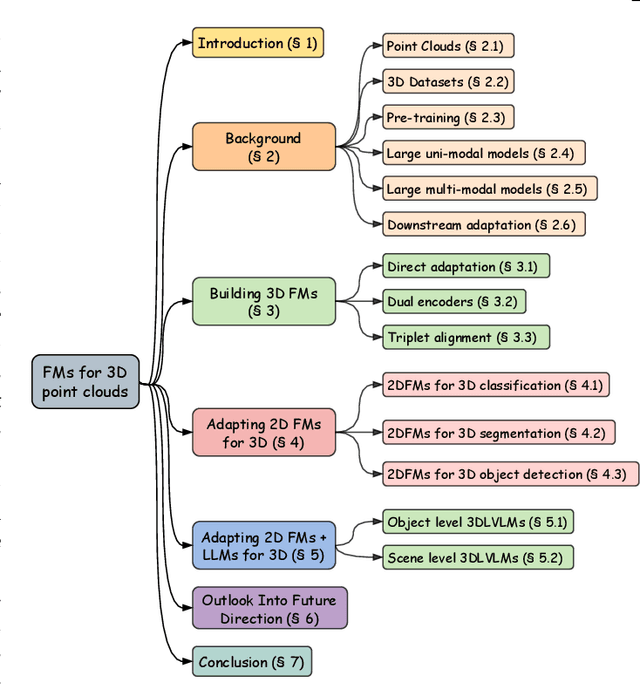
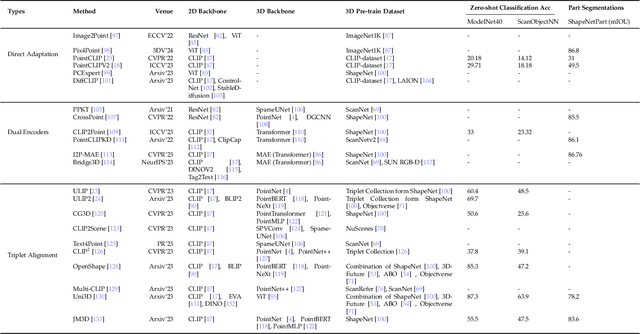
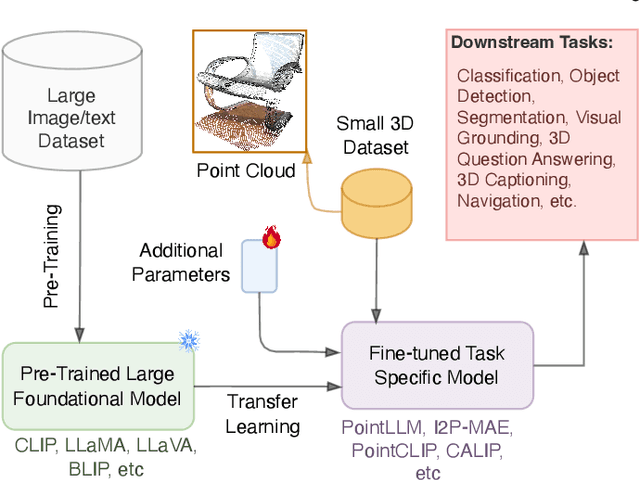

Abstract:The 3D point cloud representation plays a crucial role in preserving the geometric fidelity of the physical world, enabling more accurate complex 3D environments. While humans naturally comprehend the intricate relationships between objects and variations through a multisensory system, artificial intelligence (AI) systems have yet to fully replicate this capacity. To bridge this gap, it becomes essential to incorporate multiple modalities. Models that can seamlessly integrate and reason across these modalities are known as foundation models (FMs). The development of FMs for 2D modalities, such as images and text, has seen significant progress, driven by the abundant availability of large-scale datasets. However, the 3D domain has lagged due to the scarcity of labelled data and high computational overheads. In response, recent research has begun to explore the potential of applying FMs to 3D tasks, overcoming these challenges by leveraging existing 2D knowledge. Additionally, language, with its capacity for abstract reasoning and description of the environment, offers a promising avenue for enhancing 3D understanding through large pre-trained language models (LLMs). Despite the rapid development and adoption of FMs for 3D vision tasks in recent years, there remains a gap in comprehensive and in-depth literature reviews. This article aims to address this gap by presenting a comprehensive overview of the state-of-the-art methods that utilize FMs for 3D visual understanding. We start by reviewing various strategies employed in the building of various 3D FMs. Then we categorize and summarize use of different FMs for tasks such as perception tasks. Finally, the article offers insights into future directions for research and development in this field. To help reader, we have curated list of relevant papers on the topic: https://github.com/vgthengane/Awesome-FMs-in-3D.
Sebra: Debiasing Through Self-Guided Bias Ranking
Jan 30, 2025



Abstract:Ranking samples by fine-grained estimates of spuriosity (the degree to which spurious cues are present) has recently been shown to significantly benefit bias mitigation, over the traditional binary biased-\textit{vs}-unbiased partitioning of train sets. However, this spuriosity ranking comes with the requirement of human supervision. In this paper, we propose a debiasing framework based on our novel \ul{Se}lf-Guided \ul{B}ias \ul{Ra}nking (\emph{Sebra}), that mitigates biases (spurious correlations) via an automatic ranking of data points by spuriosity within their respective classes. Sebra leverages a key local symmetry in Empirical Risk Minimization (ERM) training -- the ease of learning a sample via ERM inversely correlates with its spuriousity; the fewer spurious correlations a sample exhibits, the harder it is to learn, and vice versa. However, globally across iterations, ERM tends to deviate from this symmetry. Sebra dynamically steers ERM to correct this deviation, facilitating the sequential learning of attributes in increasing order of difficulty, \ie, decreasing order of spuriosity. As a result, the sequence in which Sebra learns samples naturally provides spuriousity rankings. We use the resulting fine-grained bias characterization in a contrastive learning framework to mitigate biases from multiple sources. Extensive experiments show that Sebra consistently outperforms previous state-of-the-art unsupervised debiasing techniques across multiple standard benchmarks, including UrbanCars, BAR, CelebA, and ImageNet-1K. Code, pre-trained models, and training logs are available at https://kadarsh22.github.io/sebra_iclr25/.
Differentiable Interacting Multiple Model Particle Filtering
Oct 01, 2024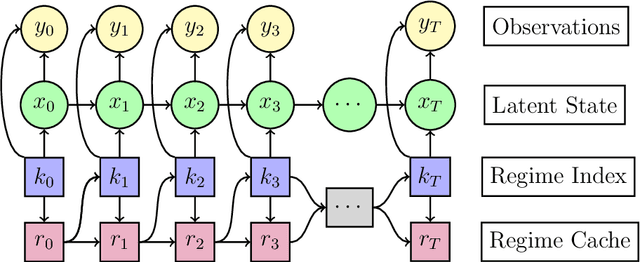
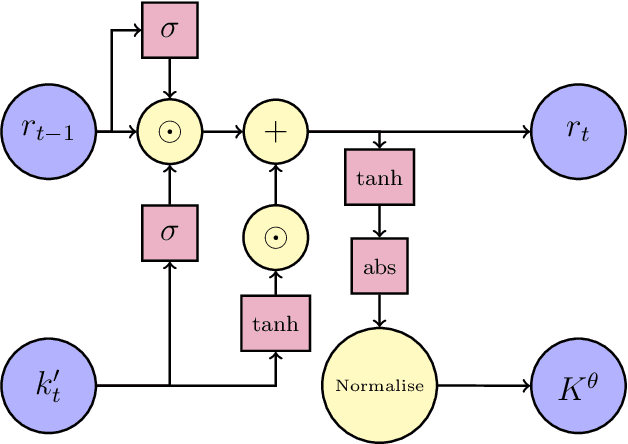

Abstract:We propose a sequential Monte Carlo algorithm for parameter learning when the studied model exhibits random discontinuous jumps in behaviour. To facilitate the learning of high dimensional parameter sets, such as those associated to neural networks, we adopt the emerging framework of differentiable particle filtering, wherein parameters are trained by gradient descent. We design a new differentiable interacting multiple model particle filter to be capable of learning the individual behavioural regimes and the model which controls the jumping simultaneously. In contrast to previous approaches, our algorithm allows control of the computational effort assigned per regime whilst using the probability of being in a given regime to guide sampling. Furthermore, we develop a new gradient estimator that has a lower variance than established approaches and remains fast to compute, for which we prove consistency. We establish new theoretical results of the presented algorithms and demonstrate superior numerical performance compared to the previous state-of-the-art algorithms.
H-FCBFormer Hierarchical Fully Convolutional Branch Transformer for Occlusal Contact Segmentation with Articulating Paper
Jul 10, 2024Abstract:Occlusal contacts are the locations at which the occluding surfaces of the maxilla and the mandible posterior teeth meet. Occlusal contact detection is a vital tool for restoring the loss of masticatory function and is a mandatory assessment in the field of dentistry, with particular importance in prosthodontics and restorative dentistry. The most common method for occlusal contact detection is articulating paper. However, this method can indicate significant medically false positive and medically false negative contact areas, leaving the identification of true occlusal indications to clinicians. To address this, we propose a multiclass Vision Transformer and Fully Convolutional Network ensemble semantic segmentation model with a combination hierarchical loss function, which we name as Hierarchical Fully Convolutional Branch Transformer (H-FCBFormer). We also propose a method of generating medically true positive semantic segmentation masks derived from expert annotated articulating paper masks and gold standard masks. The proposed model outperforms other machine learning methods evaluated at detecting medically true positive contacts and performs better than dentists in terms of accurately identifying object-wise occlusal contact areas while taking significantly less time to identify them. Code is available at https://github.com/Banksylel/H-FCBFormer.
Bayesian Detector Combination for Object Detection with Crowdsourced Annotations
Jul 10, 2024



Abstract:Acquiring fine-grained object detection annotations in unconstrained images is time-consuming, expensive, and prone to noise, especially in crowdsourcing scenarios. Most prior object detection methods assume accurate annotations; A few recent works have studied object detection with noisy crowdsourced annotations, with evaluation on distinct synthetic crowdsourced datasets of varying setups under artificial assumptions. To address these algorithmic limitations and evaluation inconsistency, we first propose a novel Bayesian Detector Combination (BDC) framework to more effectively train object detectors with noisy crowdsourced annotations, with the unique ability of automatically inferring the annotators' label qualities. Unlike previous approaches, BDC is model-agnostic, requires no prior knowledge of the annotators' skill level, and seamlessly integrates with existing object detection models. Due to the scarcity of real-world crowdsourced datasets, we introduce large synthetic datasets by simulating varying crowdsourcing scenarios. This allows consistent evaluation of different models at scale. Extensive experiments on both real and synthetic crowdsourced datasets show that BDC outperforms existing state-of-the-art methods, demonstrating its superiority in leveraging crowdsourced data for object detection. Our code and data are available at https://github.com/zhiqin1998/bdc.
Regime Learning for Differentiable Particle Filters
May 08, 2024Abstract:Differentiable particle filters are an emerging class of models that combine sequential Monte Carlo techniques with the flexibility of neural networks to perform state space inference. This paper concerns the case where the system may switch between a finite set of state-space models, i.e. regimes. No prior approaches effectively learn both the individual regimes and the switching process simultaneously. In this paper, we propose the neural network based regime learning differentiable particle filter (RLPF) to address this problem. We further design a training procedure for the RLPF and other related algorithms. We demonstrate competitive performance compared to the previous state-of-the-art algorithms on a pair of numerical experiments.
 Add to Chrome
Add to Chrome Add to Firefox
Add to Firefox Add to Edge
Add to Edge